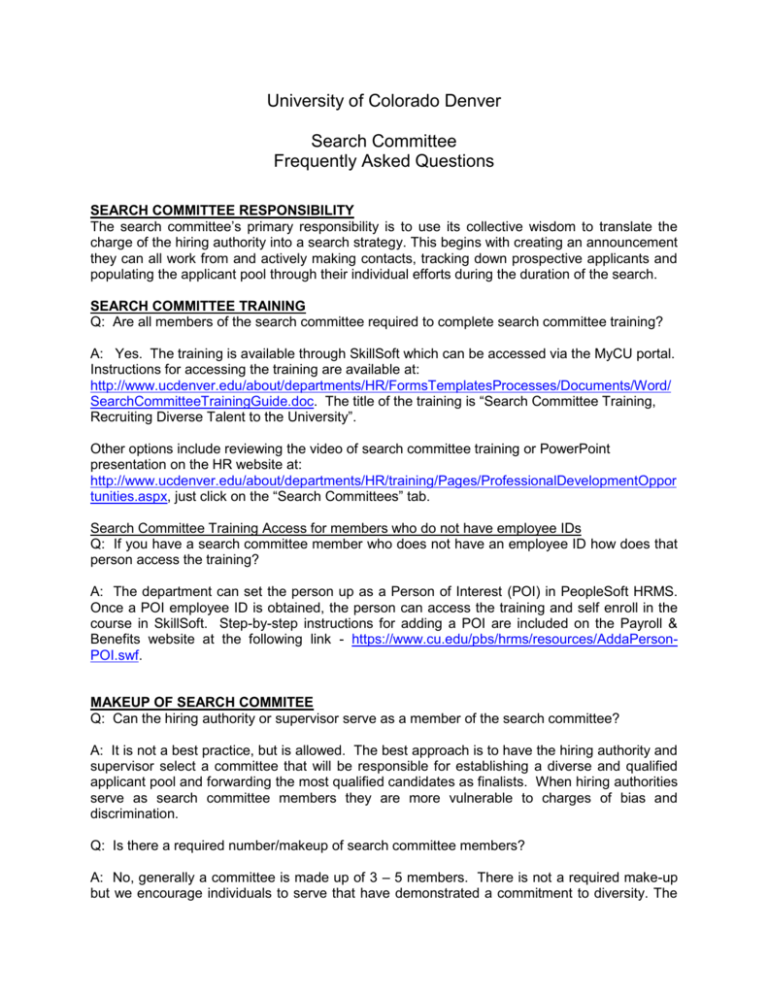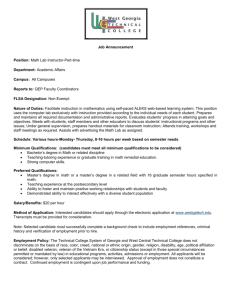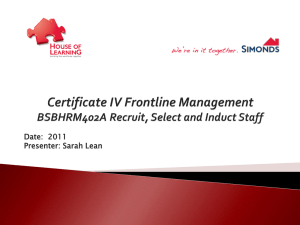Search Committee FAQs - University of Colorado Denver
advertisement

University of Colorado Denver Search Committee Frequently Asked Questions SEARCH COMMITTEE RESPONSIBILITY The search committee’s primary responsibility is to use its collective wisdom to translate the charge of the hiring authority into a search strategy. This begins with creating an announcement they can all work from and actively making contacts, tracking down prospective applicants and populating the applicant pool through their individual efforts during the duration of the search. SEARCH COMMITTEE TRAINING Q: Are all members of the search committee required to complete search committee training? A: Yes. The training is available through SkillSoft which can be accessed via the MyCU portal. Instructions for accessing the training are available at: http://www.ucdenver.edu/about/departments/HR/FormsTemplatesProcesses/Documents/Word/ SearchCommitteeTrainingGuide.doc. The title of the training is “Search Committee Training, Recruiting Diverse Talent to the University”. Other options include reviewing the video of search committee training or PowerPoint presentation on the HR website at: http://www.ucdenver.edu/about/departments/HR/training/Pages/ProfessionalDevelopmentOppor tunities.aspx, just click on the “Search Committees” tab. Search Committee Training Access for members who do not have employee IDs Q: If you have a search committee member who does not have an employee ID how does that person access the training? A: The department can set the person up as a Person of Interest (POI) in PeopleSoft HRMS. Once a POI employee ID is obtained, the person can access the training and self enroll in the course in SkillSoft. Step-by-step instructions for adding a POI are included on the Payroll & Benefits website at the following link - https://www.cu.edu/pbs/hrms/resources/AddaPersonPOI.swf. MAKEUP OF SEARCH COMMITEE Q: Can the hiring authority or supervisor serve as a member of the search committee? A: It is not a best practice, but is allowed. The best approach is to have the hiring authority and supervisor select a committee that will be responsible for establishing a diverse and qualified applicant pool and forwarding the most qualified candidates as finalists. When hiring authorities serve as search committee members they are more vulnerable to charges of bias and discrimination. Q: Is there a required number/makeup of search committee members? A: No, generally a committee is made up of 3 – 5 members. There is not a required make-up but we encourage individuals to serve that have demonstrated a commitment to diversity. The larger the committee the harder it will be to coordinate schedules which may lengthen the overall process. HIRING AUTHORITY CHARGE Q: Does the hiring authority have to charge the search committee prior to the ad being posted? A: The hiring authority should outline the expectations of the search process including timeline, ranking preference, budget, diversity outreach expectations, etc., to the committee prior to the ad being finalized/posted. The best practice is to do this during the initial meeting of the search committee. The charge can be shared via e-mail if a meeting is not possible. SHARING SEARCH COMMITTEE MEMBER MAKEUP Q: Is it appropriate to share the names of the search committee members with applicants if they request the information? A: Yes, if the applicant asks for the information, it is fine to share the information and it demonstrates that the applicant is engaged in the process. DETERMINING TIMEFRAME FOR REVIEW OF APPLICANTS Q: When can the search committee stop reviewing applicants in the pool if the position is posted as open until filled? A: If the announcement is open until filled you have maximum flexibility and review applicants as they apply. In your ad you can include language that indicates a timeframe: Review of applications will continue until finalists are identified or applications will be accepted until finalists are identified, but full consideration will be given to complete applications received by ________. MINIMUM QUALIFICATIONS/BEHAVIORAL CHARACTERISTICS/SUBSTITUTION Q: Should behavioral characteristics critical to the position be included in the minimum qualification section of the job ad? A: There isn’t anything that prohibits it, but they are hard to screen. They can be included in the preferred qualifications and can also be screened during the interview process. Q: Can you include a substitution for required education for minimum qualifications (i.e., a bachelor’s degree)? A: Yes, it is fine to include a substitution. Ensure the experience that will substitute for the substitution is clearly defined so you can screen for it. SCREENING TOOLS Q: Is the search committee required to use a scoring matrix to determine if applicants meet minimum qualifications/preferred qualifications? A: A matrix can be used but it is not mandatory. Search committee members should review applicant materials prior to the meeting where a decision will be made as to who will be invited to interview. The goal is for the committee to have a discussion regarding candidates and whether they fit the yes, maybe and no categories based on experience and education. If a matrix is used individually by committee members it does not need to be turned in. The notes should be shred after the search is complete. SCREENING FOR MINIMUM QUALIFICATIONS Q: Can the committee consider an applicant who has not demonstrated that they meet all of the minimum qualifications listed in the job announcement? A: No. It is important to consider this when creating the announcement and determine if the minimum qualification could be moved to preferred qualifications so that good candidates to not self-select out. Q: Can you exclude an applicant that appears to be over-qualified? A: If the candidate meets minimum qualifications you should screen them against preferred qualifications and determine from there if they should be invited for an interview. SALARY RANGE Q: Does the salary range have to be included in the announcement? A: No, but by including the salary range it will provide an idea of the value of the job at that time and candidates who apply will have realistic expectations regarding salary. The budget of the department should be taken into consideration and if the School, College, or department can only afford a certain range that can be included in the ad Sample language: A salary range has been established at ____ and is negotiable commensurate with candidates experience and education. You can add information regarding the benefits available to market the added value of benefits. If you do not include the range in the ad, it is not recommended that the candidate be asked to provide a salary history or salary requirement. INTERVIEWS WITH SEARCH COMMITTEE Q: Does the search committee have to conduct interviews to determine who will be invited to interview with the hiring authority? A: Yes. The interviews can be in person, over the phone, or via teleconference. Q: Is it necessary to ask applicants the same questions? A: It is important to ask the same initial questions so that each candidate has the same opportunity to respond to the questions established that will help the committee determine who will be moved forward in the process. It is fine to ask additional, follow-up questions. Q: When should the search committee discuss if the applicant will be moved forward in the process? A: When scheduling interviews the committee can allow time between applicants for this discussion or allow time to discuss following all of the interviews. This will help the committee decide who will move forward. METHOD OF INTERVIEWING CANDIDATES Q: If the committee has three candidates from out of state, one in state, and one internal applicant can the interviews for the out of state candidates be conducted over the phone and in person for the other two applicants? A: The best practice is to conduct all interviews in the same manner (even if the internal candidate’s office is right down the hall from where the interviews will be conducted.) If an alternate approach is taken, it is best if it is the applicant requesting the alternate method to avoid claims of discrimination and bias. SEARCH COMMITTEE MEMBERS WHO CAN’T MAKE ALL MEETINGS/INTERVIEWS Q: If members of the search committee can’t make all of the meetings/interviews can they evaluate the candidates they missed? A: No, they should provide input only for those who they have been able to observe. If telephone interviews were conducted it is fine to tape the interviews or if interviews were conducted via teleconference it is fine to share a DVD of the interview(s) with those committee members who missed the interview(s). FEEDBACK FROM SEARCH COMMITTEE MEMBERS Search Committee Notes Q: Are the notes that search committee members take during the search process available to the hiring authority? A: Search committee members may share their verbal or written information and assessments. Most hiring authorities request a candidate summary with strengths and weaknesses that may include some form of the search committee notes, if not the actual notes. The search committee cannot, however, be required to take personal notes or make them legible or comprehensible to someone else. Ultimately, all versions of the notes should be destroyed as soon as possible following the completion of the search. Q: Can a member of the search committee who has first-hand knowledge regarding the performance of an applicant share the information with the committee? A: Yes, the search committee should share the information with the committee. If unsolicited feedback is provided from sources outside the committee, consider who is providing feedback and possible motives. It should be first-hand knowledge vs. hear say PUBLIC RECORD Q: When does the applicant’s candidacy become public record? A: Once a person is notified that they are a finalist they must be informed that their candidacy will be made public. SPOUSAL HIRE Q: Can the search committee commit to hiring the spouse of a finalist? A: No, the search committee can’t commit, but the search committee can connect the spouse with the School, College or Department with the opening where they might be best suited. Primary department may or may not pay all or a portion of the trailing spouses salary if funding is available. REFERENCE CHECKS Q: Is it appropriate for search committee members to contact colleagues at the employer of the applicant to check them out? A: No, you must ask the applicant if it is okay to check listed reference as well as off-list references (including colleagues). Typically references are checked at the finalist stage, either prior to inviting applicants to campus or prior to an offer. Q: Should the search committee or the hiring authority conduct the reference checks? A: It can be completed by either party. Reference Check Tips: Introduce yourself and explain that the candidate has been designated as a finalist and is aware that we are making these calls. Briefly describe the position, including the title, scope of responsibility and major challenges we are facing. As a warm up, begin by asking for a brief assessment of the candidate’s strengths and weaknesses in his/her former or current roles. Ask for a specific example of an initiative lead by the candidate, how they achieved success, responded to setbacks and learned to adapt to subsequent challenges. Ask for a specific observation about the candidate's ability to respond to conflict or institutional barriers, including how they developed key relationships and achieved resolution. Finally, ask them if they would consider this candidate competitive for a comparable position at their own institution and why. Follow-up questions are encouraged throughout the discussion. Explain that the candidate has also granted us permission to contact others who have not been specifically listed as references and ask them to suggest others who are familiar with the candidate. Do not ask about the candidate’s personal circumstances or respond in any way to such comments. Remember that we are trying to recruit candidates, not just evaluate them, and information exchanged may get back to them. Similarly, many candidates we call about will remain where they work now. We do not want to do anything to make that situation difficult or discourage them (or the person giving the reference) from applying for future positions here. Do not share your own or the committee's observations about the candidates. Last updated 3-2010





